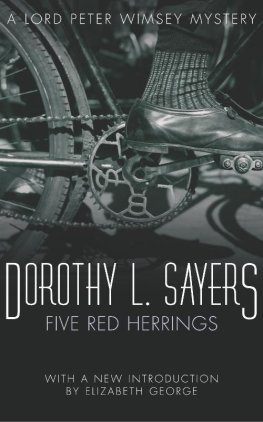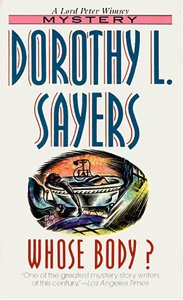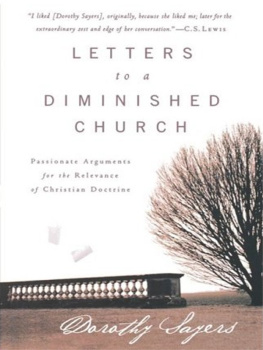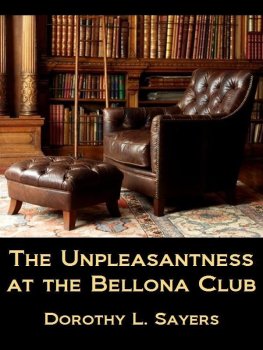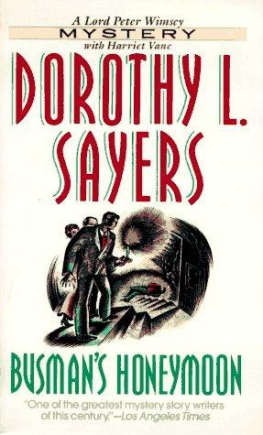Dorothy Sayers - The Wimsey Papers
Here you can read online Dorothy Sayers - The Wimsey Papers full text of the book (entire story) in english for free. Download pdf and epub, get meaning, cover and reviews about this ebook. genre: Prose. Description of the work, (preface) as well as reviews are available. Best literature library LitArk.com created for fans of good reading and offers a wide selection of genres:
Romance novel
Science fiction
Adventure
Detective
Science
History
Home and family
Prose
Art
Politics
Computer
Non-fiction
Religion
Business
Children
Humor
Choose a favorite category and find really read worthwhile books. Enjoy immersion in the world of imagination, feel the emotions of the characters or learn something new for yourself, make an fascinating discovery.

- Book:The Wimsey Papers
- Author:
- Genre:
- Rating:5 / 5
- Favourites:Add to favourites
- Your mark:
- 100
- 1
- 2
- 3
- 4
- 5
The Wimsey Papers: summary, description and annotation
We offer to read an annotation, description, summary or preface (depends on what the author of the book "The Wimsey Papers" wrote himself). If you haven't found the necessary information about the book — write in the comments, we will try to find it.
The Wimsey Papers — read online for free the complete book (whole text) full work
Below is the text of the book, divided by pages. System saving the place of the last page read, allows you to conveniently read the book "The Wimsey Papers" online for free, without having to search again every time where you left off. Put a bookmark, and you can go to the page where you finished reading at any time.
Font size:
Interval:
Bookmark:
Dorothy L. Sayers
Wimsey Papers
(being war-time letters and documents of the Wimsey family)
The Wimsey Papers, pt. I
1. Honoria Lucasta, Dowager Duchess of Denver, to her American friend, Cornelia, wife of Mr. Lambert B. Vanderhuysen, of New York.
BREDON HALL,
DUKE'S DENVER,
NORFOLK
November 12th, 1939.
Dear Cornelia,
I think I had better write you my usual Christmas letter now, because naturally the War has upset the posts a little, and one can't really expect ships to go quickly when they are convoyed about like a school crocodile, so tedious for them, or keep to Grand Geometry, or whatever the straight course is called when they have to keep darting about like snipe to avoid submarines, and anyway I like to get my correspondence in hand early and not do it at the last moment with one's mind full of Christmas trees though I suppose there will be a shortage of those this year, but, as I said to Miss Bates, our village schoolmistress, so long as the children get their presents I don't suppose they'll mind whether you hang them on a conifer or the Siegfried Line, and as a matter of fact Denver is thinning a lot of little firs out of the plantation, and you'd better ask him for one before he sends them all to the hospitals.
And really, Cornelia, I think you must have been listening to Goering or Goebbels or that Haw-Haw man or something the suburbs aren't in ruins and Oxford and Cambridge haven't been invaded by anything worse than a lot of undergraduates from other universities, so good for both sides, I think, though I'm told the plague of bicycles in the streets is quite a menace still, it never was anything else and we've got plenty of butter and guns, if it comes to that, though they keep on saying they're going to ration them, just as Hitler keeps on saying he's going to begin, only he doesn't go, like the people in the Pirates of Penzance, and Peter says if he waits much longer the audience will refuse to clap and perhaps the Munich bomb was in the nature of a cat-call, but what I say is, if little Adolf found anything nasty in that beer-cellar he must have brought it with him. And, talking of Peter, I can't really tell you where he is, because he's gone back to his old job, and everything comes without any proper address through the Foreign Office. I rather fancy he may have been in Turkey a little while ago, from something he said about the coffee being good; I can't think of any other place where that would be likely to happen, because he never really likes French coffee (too much chicory), and nobody else seems to have any, except us, and I know he's somewhere abroad, the letters take so long. Wherever it was, he isn't there now, and that makes me think it must have been Turkey, because they seem to have settled everything splendidly there. But of course this is only guess-work.
It's very hard on poor Harriet, his being sent off like that, but she is being very sensible they've shut the London house and she's gone down to Talboys with the children I enclose a photograph of little Paul, he's nearly a year old now, and Bredon just three, how time flies! and Mary's youngsters are there, too. She's doing A.R.P work and looking after her husband you remember him, Charles Parker, the C.I.D. Chief Inspector naturally he can't leave town. They seem well and happy and very busy. Charles was a little upset the other day over finding two human legs (a very bad match) in a police-post, tied up in brown paper. He said it made him feel he was going to miss Peter. However, it turned out they had only been left there by a man who was taking them to a hospital and had popped them inside out of the rained while he hunted for a taxi in the black-out and it would all have been cleared up quite quickly, only when the poor man had found the taxi he'd forgotten where the police-post was, and drove wildly round the West End looking for it, so confusing, but one must expect these little inconveniences in war-time. And propos of sandbags (oh, no, I didn't mention them, but the police-post was built of sandbags, a sort of little hut, you know, like a night-watchman's) you can't think how queer Piccadilly Circus looks with Eros gone and a sort of pyramid like King Cheops' on a small scale built up over the fountain though why they should take all that trouble I can't think, unless it's the water-mains, except that people feel very sentimental about it and if anyone dropped a bomb on it they'd feel the heart of the Empire had stopped beating. Peter says we ought to do something constructive in the opposite direction and floodlight the Albert Memorial because the Park would be better without it, but poor Queen Victoria would turn in her grave and, as I reminded him, he didn't know Queen Victoria personally: I did.
Yes, my dear, we are all quite all right. Denver is worried about Jerry, of course, because he's in the R.A.F., and naturally that's rather dangerous, but dear boy, how he is enjoying himself, being able to go just as fast as he likes (you remember how he used to terrify us with that big racing-car). His father says he ought to have got married to somebody first, so as to provide an heir in case of accidents. "Really, Gerald," I said, "fancy worrying about that at a time like this. If there's anything left to be heir to when we've finished paying for the War, Peter's got two boys and, judging by Jerry's present taste in young women, we are mercifully spared." That was rather tactless, I suppose, because Gerald's fretting quite enough about the estate already; he says we shall be ruined, of course, but he doesn't mind that if only he can do his duty by the land.
And then we've got a big boy's school in the West Wing, and that gets on his nerves sometimes, still, most fortunately, Helen isn't here, which relieves the tension. As you know, I never like to criticise my daughter-in-law, but she is a very difficult sort of person and I was devoutly thankful when she took herself off to the Ministry of Instruction and Morale. What she can possibly have to instruct anyone about I don't know, but as the place is packed with everybody's wives and nephews and all the real jobs seem to have been handed over to the other departments it's as good a spot as any to intern the nation's trouble-makers, and she's got three secretaries paid by a grateful country to endure her, so all is for the best. There was a picture of her in the papers last week, glaring like the wrath of God at poor little Sir Chitterley Rumph, and when Denver saw it I thought he'd burst a blood-vessel or have a blood-bath or something, only fortunately, just as that moment, one of our little evacuees put a cricket-ball through the long window of the yellow saloon, and in the strain of trying to swear on two fronts at once the frightfulness blew itself off. They are all elementaries (the evacuees, I mean) from a rather slummy bit of London, and I'm afraid the infant cherub with the cricket-ball made pique, repique and capot of Denver before he could score half his vocabulary. Curious and charming, isn't it, how much the peerage and the proletariat have in common, once you get down to the raw stuff of life, so to speak. Any nice middle-class foster-parent would have turned purple, but Gerald burst out laughing and has begun to take quite an interest in the school. In fact, he's offered to umpire their end-of-term sports competition, and has lent them a pony for riding lessons!
Well, my dear, I must stop now and see a deputation from the Women's Rural Institute, who are getting up a Nativity Play for Polish refugees, so sweet of them, and most providentially there's a full moon for Christmas, so we shall get a good audience. I have promised to play "Anna, a prophetess" I'd forgotten there was such a person, so I must look her up quickly before they come. We carry on, you see, war or no war "we don't take no account of black-outs in these parts," having never known the bright-lights. (Dear me, Cornelia, what would you do with a black-out in New York?) And, as for wars, this is a very old country, and we can remember a great many of them.
Font size:
Interval:
Bookmark:
Similar books «The Wimsey Papers»
Look at similar books to The Wimsey Papers. We have selected literature similar in name and meaning in the hope of providing readers with more options to find new, interesting, not yet read works.
Discussion, reviews of the book The Wimsey Papers and just readers' own opinions. Leave your comments, write what you think about the work, its meaning or the main characters. Specify what exactly you liked and what you didn't like, and why you think so.

